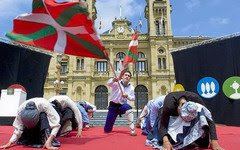
Basque Info 16/12/08
-Basques tortured during 60th anniversary of the Declaration of Human Rights.
A French-Spanish police operation against ETA finished with eight people arrested. Three were arrested in France and five were arrested in the south of the Basque Country. It seems as though the French police allowed five to escape from their operation in order to let the Spanish police arrest them and torture them.
All of them have been sent to prison after five days incommunicado. During those days they were brutally tortured by the Spanish police. They were blind-folded and kept naked for the whole time; they were beaten, drenched in cold water, constantly suffocated with plastic bags and threatened with electric shocks and with being raped.
All of this happened while the world celebrated the 60th anniversary of the Declaration of Human Rights. The Spanish government took this opportunity to launch an alleged plan to stop torture. The anti-repression organization Askatasuna denounced the hypocrisy of such a thing and accused the Spanish government of using torture as a war tool against the Basque pro-independence movement.
Askatasuna stated that at least 60 Basque citizens have been tortured this year.
In fact, 44 anti-torture Spanish groups criticized the Spanish government plan against torture. In a public letter they addressed to the Spanish prime minister Zapatero, they ask the government to follow the UNO recommendations and cease the incommunicado practice.
The Spanish branch of Amnesty International asked, along with the suppression of the incommunicado practice, for the use of video recording of the whole process of detention.
Hundreds of people demonstrated in support of the detainees in their home towns during the week.
-Spanish government tries to divide Basque political prisoners.
Last week the Spanish home minister Rubalcaba defended the need for the dispersal policy against Basque political prisoners as a tool and a state policy to defeat ETA. 761 Basque political prisoners are scattered in 85 jails across French and Spanish territories at hundreds of miles from their homes and relatives. UNO has constantly denounced this practice as against human rights.
80 former Basque political prisoners gathered at a press conference last Saturday to denounce the latest Spanish government attempt to cause divisions and to use the Basque prisoners' collective as political hostages. They said the Spanish government want to prolong the conflict.
The Basque political prisoners’ relatives’ organization, Etxerat, said that 17 friends and relatives have died in road accidents on their way to visit their loved ones in prison during the past 20 years. The latest accident left two relatives injured last week.
Etxerat called a national demonstration on prisoners for 3rd of January next, with the main demands being: No to the death sentence! No to sentences without end! Basque prisoners to the Basque country!
Last week the three Basque western provinces' government called for the immediate release of all seriously ill prisoners.
Hundreds of people gather every Friday in more than 60 villages and towns across the Basque Country to show support for the Basque political prisoners.
-Thousands of people gathered in support of Basque language.
In 1978 40,000 people filled Bilbao’s football stadium to defend the Basque language. In 1998 125,000 people filled the Basque Country’s five main stadiums to say yes to the Basque language. Last Saturday thousands and thousands filled the Bilbao Exhibition Centre to show their commitment to live through the Basque language.
10 years ago the Basque language organizations' council, Kontseilua, was created and a strategic plan has been developed since. With last Saturday’s event Kontseilua wanted to ask for another step on the way to achieve the right to live through Basque in a Basque-speaking Basque Country. A Ten Point Manifesto was launched and new initiatives will be put in place over the coming years.
-Solidarity with Inaki de Juana in Belfast.
Former Basque political prisoner and hunger striker Inaki de Juana appeared in a Belfast Court last week to continue fighting his extradition to Spain. The Belfast Basque Solidarity Committee and supporters gathered outside. The judge will take a decision this week to see whether an extradition process proceeds or not.

































